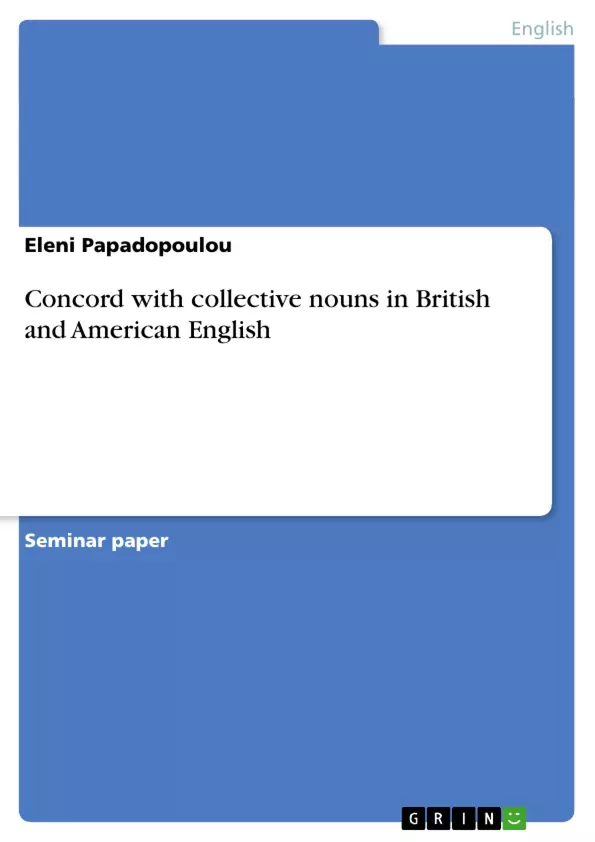1. Introduction
The main and most important part of this term paper is based upon a personal corpus- based study, which should from the start be clearly characterized as relatively restrictive and not quite large in size, in order to avoid any further problems and misunderstandings. This study I mentioned above concerns and tries to closely examine the phenomenon of collective nouns, and to be more specific, we will try to examine the concord with collective nouns in both British and American English of the 1990’s, always with the hidden desire to finally come with a reasonable conclusion towards the end of the paper.
In order to succeed in this procedure we will first try to give some short definitions of the most basic notions, which are used in the following pages. Then, we will proceed in describing the corpora, as well as the methodology used. Moreover, we will point out the problems that automatically arise from the fact of defining the collective nouns themselves on the one hand and of this corpus- based study as a whole on the other hand. After making these essential things clear, we will become more familiar with the theories regarding this subject; theories and theses that already exist, they have already been uttered and can be found in various books of grammar of the English language. Later on we will reveal and present the overall frequencies that derived from studying the corpora representing British and American English always in terms of concord with collective nouns. These frequencies will consist the exact findings of the study, regarding the percentages of collective nouns, which can be treated either as singulars or plurals. In addition, exploiting those findings a comparison should be made amongst the prevailing past theories and our findings from the corpora. Finally we will discuss potential topics for further studies on this subject, as well as the importance of the results of the study.
Inhaltsverzeichnis (Table of Contents)
- Introduction
- Corpora used
- The problem of indefinable nouns in both corpora.
- Overall frequencies
- Findings...
- Conclusion
- Bibliography ...
Zielsetzung und Themenschwerpunkte (Objectives and Key Themes)
This term paper aims to investigate the concordance of collective nouns in British and American English of the 1990s through a corpus-based study. The research focuses on analyzing the use of collective nouns as singular or plural, comparing the findings with existing grammatical theories.
- Concordance of collective nouns in British and American English
- Defining and identifying collective nouns in corpora
- Frequency analysis of collective noun concordance
- Comparison of corpus findings with existing grammatical theories
- Potential topics for further research on collective noun concordance
Zusammenfassung der Kapitel (Chapter Summaries)
- Introduction: The chapter sets the context for the study, outlining its objectives, methodology, and the corpus used. It introduces the phenomenon of collective nouns and the need to investigate their concordance in British and American English.
- Corpora Used: This chapter describes the corpora used in the study, highlighting the importance of corpus-based analysis in linguistic research. It defines the term "corpus" and discusses different types of corpora, including the specific corpora used in this study: FLOB and FROWN.
- The problem of indefinable nouns in both corpora.: This chapter delves into the complexities of defining collective nouns, particularly in the context of the chosen corpora. It discusses the challenges of identifying and categorizing nouns as collective or non-collective, and the implications for the study's analysis.
Schlüsselwörter (Keywords)
The study focuses on the key terms and concepts of corpus linguistics, collective nouns, concordance, British English, American English, and corpus analysis. It investigates the use of specific collective nouns such as data, family, team, and government in the FLOB and FROWN corpora.
Frequently Asked Questions
What is the focus of this corpus-based study?
The study examines the concord (agreement) of collective nouns in British and American English during the 1990s.
Which corpora were used for the research?
The researcher utilized the FLOB (British English) and FROWN (American English) corpora for the frequency analysis.
Can collective nouns be treated as both singular and plural?
Yes, the study reveals percentages of collective nouns that are treated as either singular or plural, comparing these findings with existing grammatical theories.
What are some examples of collective nouns analyzed?
The paper investigates nouns such as "family", "team", "government", and "data" to see how they agree with verbs and pronouns.
What challenges arise when defining collective nouns?
The study points out problems with "indefinable nouns" where it is difficult to categorize them strictly as collective or non-collective within the corpora.
- Quote paper
- Eleni Papadopoulou (Author), 2004, Concord with collective nouns in British and American English, Munich, GRIN Verlag, https://www.grin.com/document/36473



